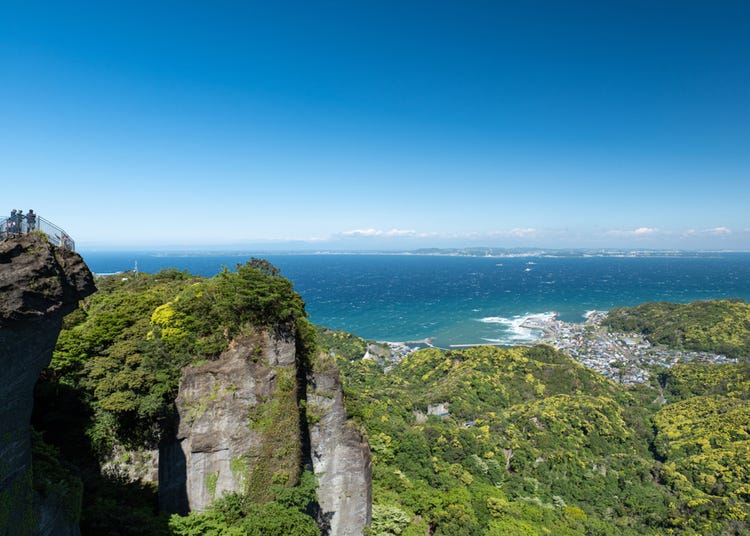
10 Summer Day Trips from Tokyo: Do You Escape or Seek the Heat?
- Written by: Dara Robinson
Looking for a way to escape the scorching Tokyo summer heat? Or somewhere to relax and soak in those sun rays? Here are 10 summer day trips from Tokyo!
Whether you’re looking for a way to cool down, or somewhere to enjoy the summer heat, we’ve got you covered. Check out our 10 side trip ideas from Tokyo, from mountains to beaches and more!
Want to Escape the Heat? Try Out These ‘Cool’ Day Trips from Tokyo!
1. Karuizawa
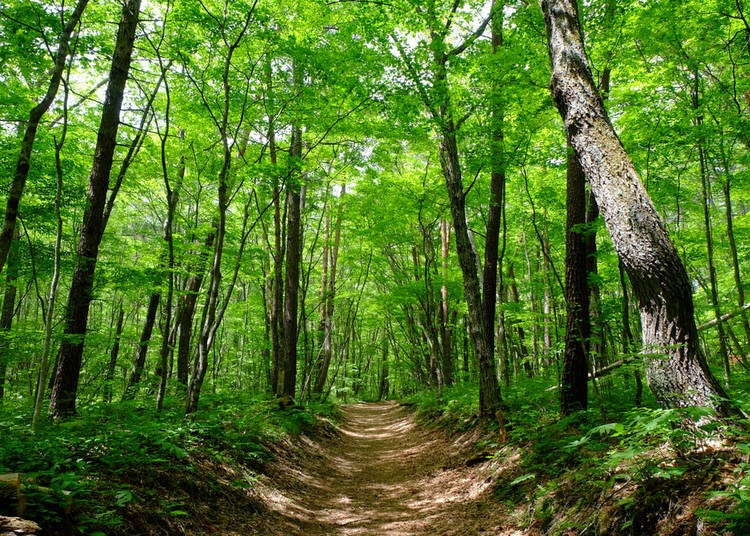
Karuizawa is a cool summer haven for those lucky enough to afford a villa in this upmarket area. For everyone else, it makes a great day trip from Tokyo, being one nice and easy bullet train ride away.
Why Karuizawa?
If you want to go somewhere with good shops, lots of food options and nature, Karuizawa is for you. It’s located at the foot of Mount Asama at a 1000m altitude, so the temperature is much cooler than in Tokyo. It has quite a Western vibe as it was originally popularised by Westerners in the late 1800s, thus many of the houses and eateries feel quite unlike most of Japan.
What can you do there?
Karuizawa is green, green grass and luscious trees everywhere. If you’re into golf, there are several famous golf clubs in the area. Outdoor sports are heavily popular, with bicycles easily available to rent near the station, and many hiking trails in the surrounding woods and mountains. There is a tourist desk at the station which can provide maps. You could stroll down the Kyu-Karuizawa Road, which is filled with interesting shops, and from there head to Naka-Karuizawa, an upmarket green space with more restaurants, parks and museums. Also of note is the Shiraito Waterfall, a striking waterfall 25 minutes bus ride from Karuizawa. There is even a shopping outlet nearby if you want to get inside for an air-conditioned shopping spree!
How to get to Karuizawa from Tokyo:
You can reach Karuizawa in 65 minutes from Tokyo Station using the JR Hokuriku Shinkansen. It costs about 5,500 yen and is covered by the JR Pass.
★Tip - Buy the JR Tokyo Wide Pass for 10,180 yen. It covers this day trip and you can use it for another two days.
If you prefer a cheaper option, you can take a highway bus from Ikebukuro for 2,700 yen each way. The bus takes three hours.
2. Nikko

Nikko is a popular town bordering the Nikko National Park. It's famous for the multitude of Buddhist Temples and Shinto Shrines that are dotted around the mountainous landscape.
Why Nikko?
Nikko will give you a chance to explore some of Japan’s many shrines and temples, while cooling off in the forest away from the scorching cement of Tokyo. You’ll find icy cold lakes and waterfalls surrounded by green foliage. And the area is famous for shaved ice made from pure spring water, naturally frozen in winter and preserved in cold air over summer.
What can you do there?
Start with the shrines near Nikko Station. The most famous is Toshogu Shrine. Toshogu Shrine is the final resting place of Tokugawa Ieyasu, who founded the Tokugawa Shogunate which ruled Japan until 1868. The shrine is full of intricate architecture, and being surrounded by forest makes it especially atmospheric. One notable feature is the wood carving of the "see no evil, speak no evil, hear no evil" monkeys manning the entrance.
After you’ve explored the shrines and historical buildings of Nikko, head to Oku-Nikko for some nature. Lake Chuzenji is a calm and scenic lake at the foot of Mount Nantai, the sacred volcano of Nikko. You can go up the Akechidaira Ropeway for a good view of the lake and nearby Kegon Waterfall, which is considered one of Japan's three most beautiful waterfalls. Or you can hike to the Falls and view it from the free observation deck. The entire area is a hiker’s paradise where you can spend the whole day just enjoying the nature.
How to get from Tokyo to Nikko:
You can reach Nikko by limited express train from Shinjuku in 2 hours for 4,080 yen each way. Make sure you reserve your seat in advance. The JR pass does not cover all of this journey, but the JR Tokyo Wide Pass does!
-

-
Address
2301, Sannai, Nikko-shi, Tochigi, 321-1431
View Map -
Nearest Station
Nikko Station (JR Nikko Line)
20 minutes on foot
- Phone Number 0288-54-0560
-
Address
2301, Sannai, Nikko-shi, Tochigi, 321-1431
-

-
Address
Chuguushi, Nikko-shi, Tochigi, 321-1661
View Map -
Nearest Station
Nikko Station (JR Nikko Line)
-
Address
Chuguushi, Nikko-shi, Tochigi, 321-1661
3. Mt. Takao
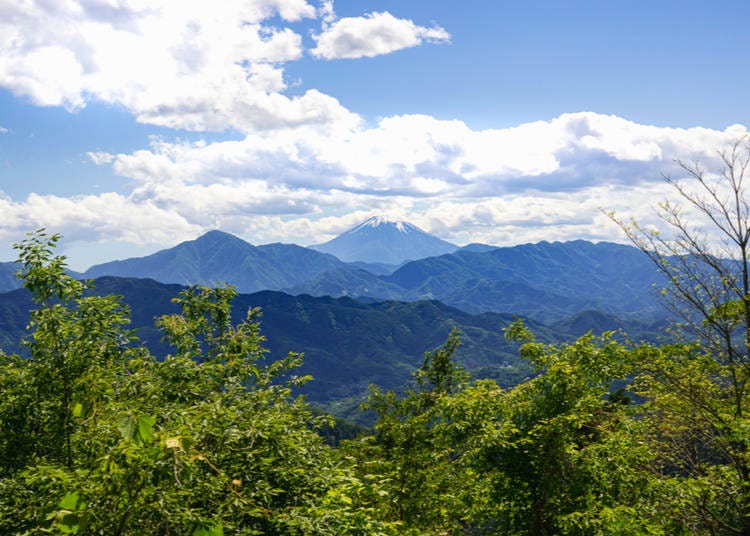
Mt. Takao is Tokyo’s most popular mountain due to its close proximity to the city. It offers what inner Tokyo lacks – greenery and hiking trails, and is a popular choice for residents looking to take a day trip from Tokyo in Summer.
Why Takao?
If you’re looking to escape the heat without traveling too far, or spending too much money, Mt. Takao is your best option.
What can you do there?
Mt. Takao is full of hiking trails of various difficulties. Most people visiting for a day trip stick to trail #1 as it is paved and easy to climb. The trail passes through the sacred shrine Yakuoin, and at the top offers a wonderful view of Mt Fuji. There is even a chairlift or cable car that goes halfway up if you don't wish to walk. The chairlift is much more exciting, however has no safety rail so be careful with small children. If however, you wish for complete nature with no paved paths, try a different trail. You can even do a multi-day hike from Mt. Takao to the connecting mountains, if you're an avid hiker. If you want to relax after a day hiking, there is even a hot spring connected to the train station!
How to get to Mt. Takao from Shinjuku:
Take an express train from Keio Railways at Shinjuku Station directly to Takaosanguchi Station. It takes 50 minutes and costs 390 yen.
-

-
Address
Takaomachi, Hachioji-shi, Tokyo, 193-0844
View Map -
Nearest Station
Takaosanguchi Station (Keio Takao Line)
5 minutes on foot
- Phone Number 042-661-4151
-
Address
Takaomachi, Hachioji-shi, Tokyo, 193-0844
4. Nagatoro
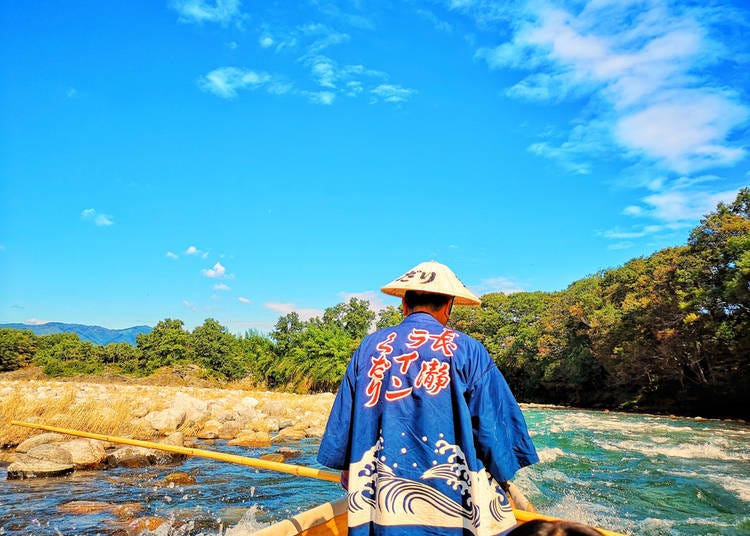
Located in neighbouring prefecture Saitama, Nagatoro is a popular spot for Tokyo residents looking for nature and adventure.
Why Nagatoro?
If you want somewhere cooler you can reach cheaply from Tokyo, or if you’re looking to enjoy water sports, Nagatoro is the best option.
What can you do there?
Nagatoro is known for its boating cruises, in which traditional-style boats are steered by two men with long poles. If you want a little more adventure, you can also opt for rafting down the river.
After you've enjoyed the river, you can head towards the mountains. There you'll find the Hodosan Mountain Shrine, said to date back to 110 A.D. After exploring the shrine, you can make the 3km hike up Hodosan mountain, or take the gondola for 820 yen return trip.
It’s also worth heading to nearby Chichibu and checking out the nature there. ★Tip - You’ll find the Moomin Valley Park nearby!
How to get from Tokyo to Nagatoro:
The cheapest way is to take the Tobu Tojo Line from Ikebukuro to Yorii station and then transfer to the Chichibu Railway at Yorii. Get off the train at Nagatoro Station. It takes 2 hours and costs 1,390 yen each way.
-

-
Address
Nagatoro, Nagatoro-machi, Chichibu-gun, Saitama, 369-1305
View Map -
Nearest Station
Nagatoro Station (Chichibu Railway)
5 minutes on foot
- Phone Number 0494-66-0307
-
Address
Nagatoro, Nagatoro-machi, Chichibu-gun, Saitama, 369-1305
5. Yuzawa
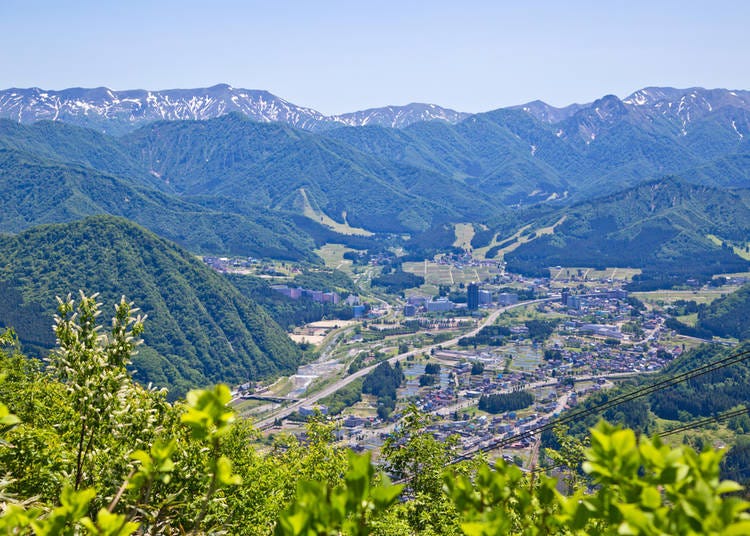
Primarily famous as a winter ski destination, Yuzawa is often mistakenly overlooked in summer.
Why Yuzawa?
Yuzawa is the coolest destination on our list and the best pick if you love summer wildflowers.
What can you do there?
Take the Yuzawa Kogen Ropeway up Yuzawa Kogen, a popular skiing mountain in Winter. Up the top you'll feel refreshed from the much cooler temperatures and beautiful views. The hills are covered in over 1000 types of colorful alpine flowers. You can also head over to the Daigenta Canyon via the Daigenta Canyon Line Bus from Echigo-Yuzawa Station. There you'll find waterfalls, hiking trails, canoes and stand-up paddleboards to rent and BBQ pits.
How to get from Tokyo to Yuzawa:
Take the Joetsu Shinkansen from Tokyo Station to Echigo-Yuzawa. It takes about 80 minutes and costs 6,500 yen each way. It is covered by both the Japan Rail Pass and the JR Tokyo Wide Pass!
-

-
Address
686, Mitsumata, Yuzawa-machi, Minamiuonuma-gun, Niigata, 949-6211
View Map -
Nearest Station
Echigo-yuzawa Station (Joetsu Line)
- Phone Number 025-788-9911
Vacancy search, reservation
-
Please enquire directly about rates.
Check with our partner site as the latest rates, rate details, and guest room requirements may vary.
-
Address
686, Mitsumata, Yuzawa-machi, Minamiuonuma-gun, Niigata, 949-6211
Want to Take in That Summer Heat? Here Are 5 Hot Day Trips From Tokyo!
6. Niijima
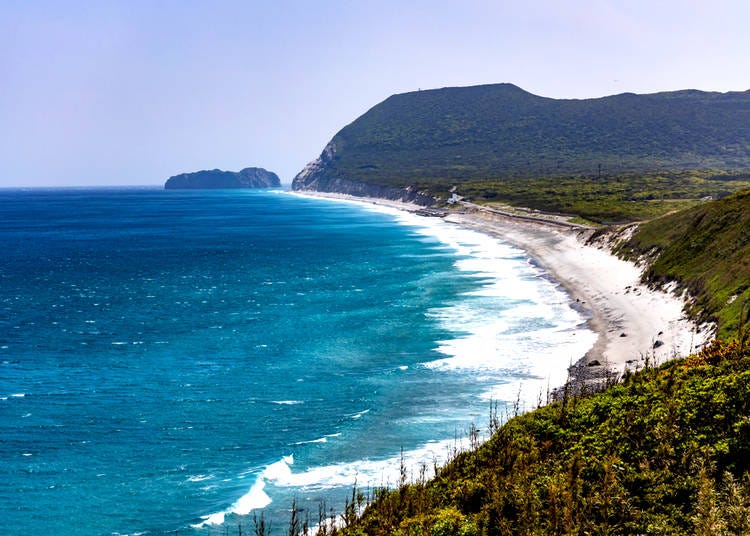
Known as a surfer's paradise with waves aplenty crashing onto its white sandy beaches, Niijima makes the perfect island getaway from Tokyo.
Why Niijima?
With its crystal clear waters and brilliantly white sand, you’ll feel like you’ve stepped onto a tropical island. It’s one of the best beaches you can find on a day trip from Tokyo.
What can you do there?
Habushiura Beach is the longest beach on the island and one of the best for surfing. There you will find several surf shops where you can rent boards and even take a lesson. The strong waves are perfect for surfers, but if you're looking for a relaxing swim, Mamashita Beach is much calmer and has some crystal clear inlets perfect for bathing in.
Niijima is not just about the beach though - it's also famous for its intricate glassware and "Moyai" carvings. These carvings are made from local stone and erected throughout the island to honor the local craftsmen.
The best way to explore the island is to rent a bicycle for the day and move around at your leisure.
How to get to Niijima from Tokyo:
The best way to reach Niijima is by high-speed jet ferry, which takes about 2.5 hours and costs 15,000 yen each way.
-
 Tokai Kisen Tokyo Takeshiba Terminal東海汽船 東京・竹芝客船ターミナル
Tokai Kisen Tokyo Takeshiba Terminal東海汽船 東京・竹芝客船ターミナル-
Address
1-12-2 Kaigan, Minato-ku, Tokyo, 105-0022
-
Nearest Station
Hamamatsucho Station (JR Keihin-Tohoku Line / JR Yamanote Line)
7 minutes on foot
- Phone Number 03-5472-9999
-
Address
1-12-2 Kaigan, Minato-ku, Tokyo, 105-0022
7. Izu Oshima
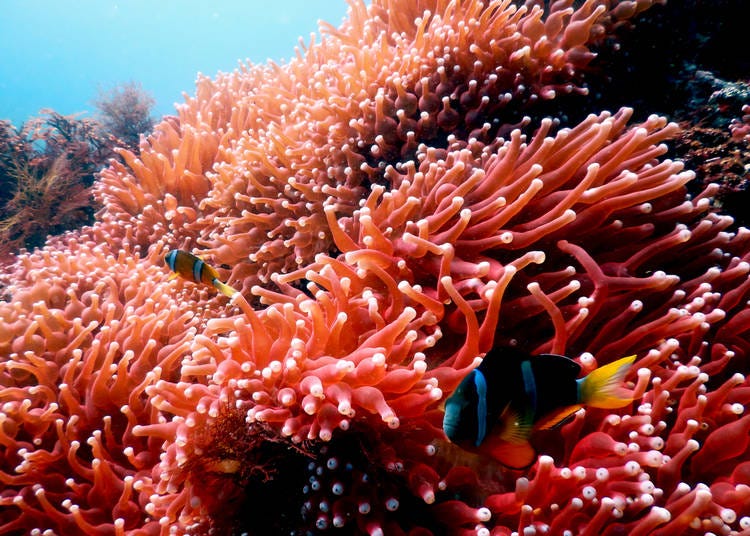
Just under two hours from mainland Tokyo by boat, Izu Oshima is a small island that offers stunning coastal views and the chance to see a more local side of Japan. Despite the fact that this peaceful, idyllic island is a far cry from the chaos that is Tokyo city, it is in fact still a part of Tokyo.
Why Izu Oshima?
If you’re looking for an off-the-beaten track part of Tokyo that offers quiet beaches and incredible snorkeling, Izu Oshima is for you.
What can you do there?
Dominating the island is the still-active volcano Mount Mihara, home to “Ura Sabaku”, an immense black desert that stretches as far as the eye can see, making you feel as if you’re walking on the moon. On a fine day you can walk through the desert and you’ll be rewarded with views of a sparkling blue sea. The mountain also offers several fairly gentle hiking courses which lead to a large volcanic crater at its summit.
If you're looking for waves, head to Sa-no-hama, the longest beach on the island and a famous nesting place for sea turtles. The most popular summer activity is scuba diving and snorkeling. Toshiki Beach is the place to go for this. If you're lucky you'll see colorful schools of fish and maybe even a hammerhead shark! And don’t worry if you don’t have equipment, there are shops around where you can rent anything you need.
If you have time, be sure to head to the Southern end of the island, where you can walk around the quaint fishing town of Habu Port. It’s a small village occupied by several old-fashioned Japanese-style homes, where the residents still to this day make a living from their fishing boats nestled in the little harbour. When you feel like taking a rest, homely café Vokyovoneten serves several tasty ashitaba flavored snacks (ashitaba is a spinach-like plant famous on the island), as well as an excellent coffee.
How to get to Izu Oshima from Tokyo:
The best way to reach the island is by high-speed ferry from Takeshiba Ferry Terminal. It takes two hours and costs 7500-8500 yen each way.
★Tip - once on the island, the easiest way to get around is by rental car, but if that's not possible you can also rent a bicycle.
8. Kamakura and Enoshima
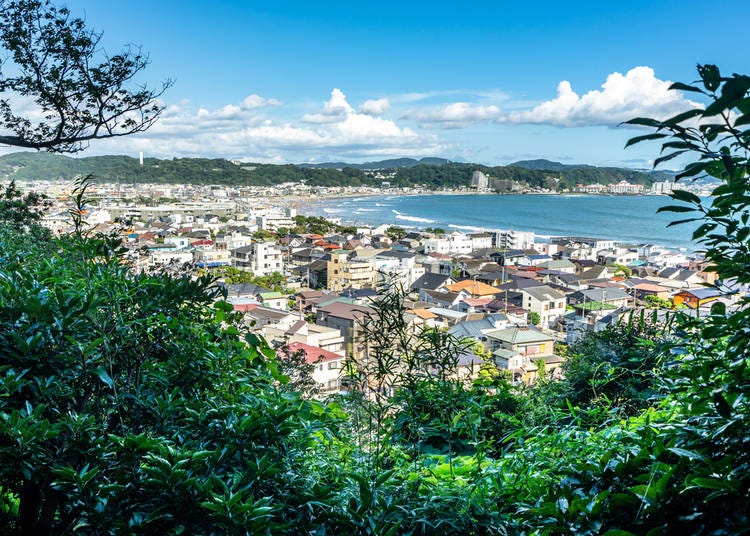
Kamakura is a coastal town about an hour from Tokyo, famous for its myriad of temples and shrines dotting mountains surrounding the township. Once home to the Kamakura Shogunate, the ruling military government of Japan, Kamakura is now more known for tourism than politics. Nearby island Enoshima is also a well-known summer destination for its casual "anything goes" beaches and summer surfer vibe.
Why Kamakura?
It’s a fun day out that’s cheap and easy. The Kamakura area combines the beach, mountains and culture all into one day. It’s a great choice if you’re looking for a beach near Tokyo.
What can you do there?
Kamakura is all about hiking and temples. It's up to personal choice which you visit, but the most popular are the Great Buddha, Hasedera and Tsurugaoka Hachimangu.
★Tip - to combine hiking and temples, start at Kita-Kamakura, visit the temples around the station then hike through the hills to the mysterious Zeniarai Benzaiten Ugafuku Shrine, and from there hike further until you reach the center of Kamakura.
Summer in Japan is scorching, so to avoid being in the sun in the worst heat, head to Enoshima in the late afternoon, where you can enjoy a swim, shaved ice (or the local specialty, a whitebait fish ice cream, if you’re feeling brave) and a walk up to the observation tower.
How to get to Kamakura and Enoshima from Tokyo:
Take the JR Shonan Shinjuku Line from Shinjuku to Kamakura. It takes one hour and costs 940 yen. Note - not all trains are direct, so you may need to change trains at Ofuna station.
To get from Kamakura to Enoshima, take the Enoden train for 25 minutes. It costs 260 yen.
-

-
Address
Minamishitauramachikamimiyada, Miura-shi, Kanagawa, 238-0101
View Map -
Nearest Station
Miurakaigan Station (Keikyu Kurihama Line)
5 minutes on foot
- Phone Number 046-888-0588
-
Address
Minamishitauramachikamimiyada, Miura-shi, Kanagawa, 238-0101
-
 Villa KamakuraVilla Kamakura
Villa KamakuraVilla Kamakura- Address 坂ノ下 2F/3F 15-14, Kamakura, Kanagawa View Map
- Original source: Booking.com
Vacancy search, reservation
-
from 24,050JPY 1room, 2adults
Check with our partner site as the latest rates, rate details, and guest room requirements may vary.
9. Southern Boso Peninsula / Nokogiriyama
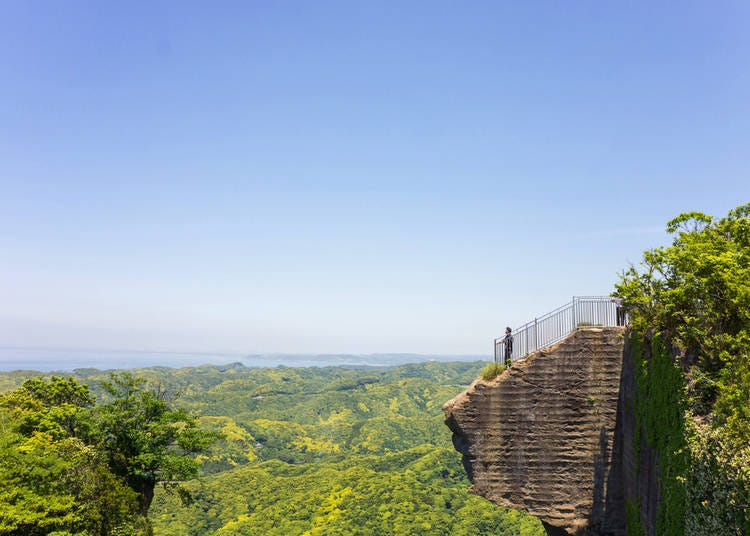
The Boso Peninsula is part of Chiba, situated just across Tokyo Bay. The Southern part is the more rural and home to a number of beaches that make easy side-trips from Tokyo.
Why the Boso Peninsula?
Lots of Tokyoites choose the Chiba beaches over the Kamakura area beaches as Chiba beaches are known for their white sand and clearer waters.
What can you do there?
The largest city in the area is Tateyama, where if you want to get really cool you can explore the Akayama Underground Tunnels, used as a command center in World War 2.
However, the main focus of this area is of course the beaches. There is Onjuku Beach, with its white sand and big waves, perfect for surfers (you can rent gear there!). There are several trendy cafes and a water park with slides! Then there is Moriya Beach and neighboring Ubara beach, horseshoe-shaped bays and white sand and waters fit for snorkeling in. These beaches are suitable for kids to swim in and have rental shops and snack huts on the beach. You could also try Hasama Beach, an easy 25-minute bus ride from Tateyama. It's a popular beach with fairly shallow, calm water.
One of the most famous sights is Mount Nokogiriyama. You may know it by the “Hell Lookout” - the boulder that juts out of the cliff into thin air, which people can climb on and get a pretty cool picture. You can climb or take a cable car up and explore the various temples and walking paths on the mountain.
How do you get to the Boso Peninsula from Tokyo?
You can reach the Boso Peninsula by catching the Tokyo Bay Ferry from Kurihama on the Kanagawa side of the Bay, to Kanaya on the other side. It costs 800 yen each way and takes 40 minutes. Kanaya is just a 10-minute walk from the Nokogiriyama Ropeway, so you could start there, then travel around the Peninsula by the JR Uchibo Line.
10. Miho Beach & Shizuoka
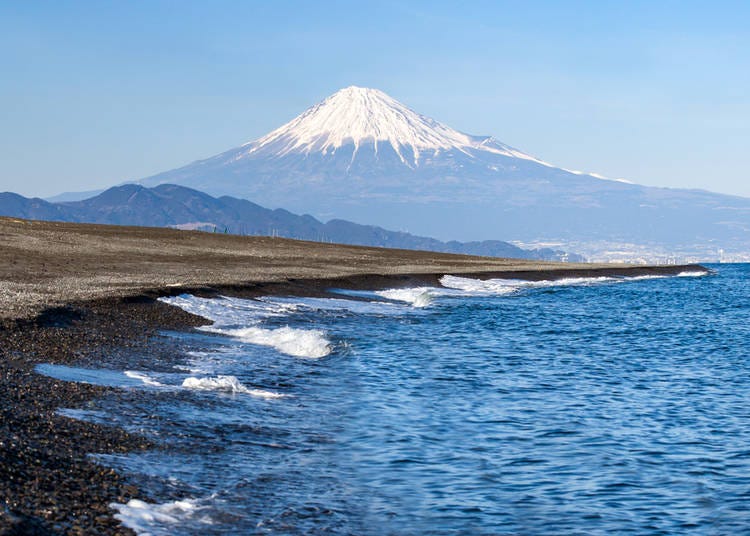
Stretching for 3km along Suruga Bay, Miho Beach is a rocky beach known for its close-up view of Mt. Fuji.
Why Miho Beach?
Go to Miho Beach to capture stunning photos showcasing Mt. Fuji behind the beach.
What can you do there?
As well as swimming and taking photos of Mt. Fuji, there are some peaceful walking and cycling trails in the pine forest behind the beach. You could combine a trip to the bay with a visit to the Nihondaira Yume Terrace, a three-floor observatory with art and history exhibits and a stunning view of Mt. Fuji and Shizuoka's bays.
Mishima is only 25 minutes from Shizuoka Station, so you could choose to try the famous Mishima Skywalk, a huge suspension bridge built to view Mt. Fuji.
How to get from Tokyo to Miho Beach:
Take the Hikari Shinkansen from Shinagawa to Shizuoka Station, then change to the JR Tokaido Line Local and get off at Shimizu. It takes about 85 minutes and costs 6,470 yen each way.
You'll need to take a 25-minute bus to reach Miho Beach, get off at Sekaiissan Miho-no-Matsubara Kaminomichi Iriguchi bus stop.
Have these 10 spots given you any ideas for summer side trips from Tokyo? Or do you have anywhere even better to recommend? Let us know!
Related Articles
Originally from New Zealand, Dara is an avid traveler, having also lived in 5 different countries. She has been a resident of Japan since 2014 and has explored all 47 of its prefectures. An aficionado of the great outdoors, Dara thrives on adrenaline-packed activities like ziplining and canyoning. Beyond her writing, she specializes in crafting custom-made tours, infusing them with personal insights and recommendations. As a mother, Dara has firsthand knowledge of navigating Japan with young ones, a perspective she weaves into her articles.
- Area
- Category
*Prices and options mentioned are subject to change.
*Unless stated otherwise, all prices include tax.
Popular Tours & Activitiess
-
Ad

The Whisper of a 1,300-Year-Old History: Meet the Other Face of Nara at Night
by: Shingo Teraoka
-
Ad

5 Recommended Wagyu Yakiniku Restaurants in Tokyo: Signature Dishes, Premium Beef, and Secret Sauces
-
Ad

The Latest Guide to "Tourism Mobility": Traveling Japan More Freely. What exactly are Japan’s version of ride-sharing and transit deserts?
-
Ad

What Makes Japanese Yakiniku So Darn Good? Guide to Cuts, Heat, and Wagyu Know-How
-
Ad

Japan’s Land of Yokai Monsters and Spooky Stories! A Deep Journey to Mysterious San’in (Tottori & Shimane) for Seasoned Travelers
-

PokéPark KANTO Is Finally Open! Tokyo's New Pokémon World Starts Before You Even Arrive (2026)
by: Guest Contributor
-

6 Popular Tokyo Summer Flower Markets: Morning Glory Fairs and Japanese Lantern Plant Markets
-

Have the Perfect Summer in Tokyo: Fun Things to Do, Eat & More
-

Tokyo in Bloom: 5 Must-Visit Spots for Japanese Flowers in June
-

Autumn in Japan 2026: Fall Foliage Forecast & Where to Enjoy the Colorful Leaves (+Tour Info)
-

8 Unfamiliar (But Totally Normal) Customs in Japan!
-

Enjoying Tokyo in Summer (June/July/August): Weather, Clothing for Adults & Kids, and Best Attractions
by: Tiffany YU
- #best ramen tokyo
- #what to buy in ameyoko
- #what to bring to japan
- #new years in tokyo
- #best izakaya shinjuku
- #things to do tokyo
- #japanese nail trends
- #what to do in odaiba
- #onsen tattoo friendly tokyo
- #daiso
- #best sushi ginza
- #japanese convenience store snacks
- #best yakiniku shibuya
- #japanese fashion culture
- #best japanese soft drinks





















